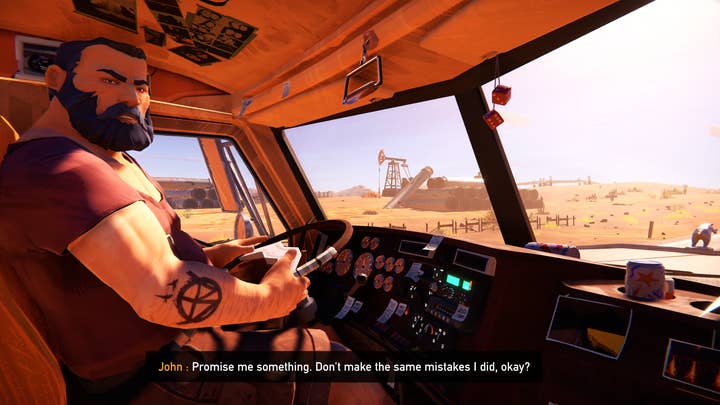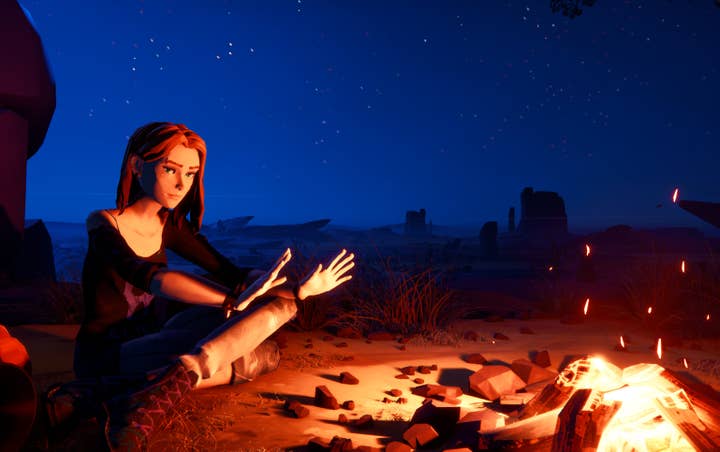The post-war road trip adventure of Yoan Fanise
Creator of Valiant Hearts and 11-11: Memories Retold discusses his break from war games with 90s film-inspired narrative game Road 96
When Yoan Fanise was still just conceiving the idea for his next game, at one point he was playing Nerial's choice-based strategy game Reigns. And as he played, he fell in love with the narrative system. Inspired, Fanise reached out to the studio to ask how the game's narrative structure worked, and had it explained.
"[I said,] 'Let's say we do that in 3D, like a real big game?' And they said, 'No, it would cost too much!'"
Fanise's inspiration from Reigns was one of many seeds that have since germinated into Road 96, Digixart's upcoming 90s road trip title about teenagers fleeing an oppressive government for freedom across the border. Speaking to GamesIndustry.biz, Fanise also cites Choose Your Own Adventure books -- which he says are especially popular in France -- as another model he admires.
"We wanted to do a totally nonlinear experience. And it was a big challenge for us"
"We wanted to do a totally non-linear experience," he says. "And it was a big challenge for us. It's not branching, it's not something like that; it's something that is never the same for the player. That was the basics of the project two years ago, and we did a lot of prototypes, a lot of things to try to get a recipe that works."
Road 96 ends up being somewhat of a rogue-lite, and the character the player controls isn't really the focus of the story. As they attempt to escape across the border, characters will repeatedly fail -- they might get arrested, waylaid, or even die. When that happens, the player takes over as a different teenager on the following day, but all the actions of the previous characters they've inhabited in the world will still have occurred, and may even be referenced if the new character encounters some of the same people.
Dark as that sounds, Fanise reassures me that, especially at the beginning, Road 96 is very lighthearted. In fact, it is inspired by a number of films and filmmakers with a penchant for over-the-top situations -- he specifically mentions Quentin Tarantino and Bong Joon-ho.
"The beginning is very funny, very crazy," he says. "A bit like Fargo, like the Coen Brothers' movies, that kind of thing. I like this kind of spirit. And we wanted to go far with the team, to not be constrained by a specific country or specific moment, because we've been in World War I for a number of years. So it was good to go with something more funny."
"When I play a game, I want it to be different from just watching TV or even those big narrative games like The Last of Us"
Fanise says he wanted to play on the cliches of 90s movies specifically, going back and forth between silly and ridiculous situations to incredibly serious moments. Among its many other influences, Fanise wanted to think of Road 96 through the lens of the movies he watched as a kid, but with some of the fuzziness that comes from remembering those movies rather than having watched them recently.
But that said, Fanise also wants Road 96 to be something more than a movie -- hence its non-linear structure.
"When I play a game, I want it to be different from just watching TV or even those big narrative games like The Last of Us," he says. "It's kind of final at the end. Even Life is Strange -- at the end you feel you did something between watching and playing, and that is good, but everybody got the [same] experience. If I'm lazy, I can just watch it on YouTube and that's it, I have the experience. Maybe I can watch two, up to three different endings, and it's gone. So as a developer, just to make something that is not like that, that you have a reason to play."
All that said, Fanise isn't just here to make a silly game. He's cognizant that the themes he's tackling are grave, and that real people escaping oppressive governments is a current, ongoing issue -- one that can't be taken lightly.

"When you start a road trip, it's a bit of a naive thing," he says. "When you start a road trip, you're young. You think, 'It's going to be fine, I'm going to make it, I'm going there.' And progressively, you're going to have trouble, you're going to meet people, and then it gets more serious on the way. But when you start you are fresh, you want to succeed, and you discover life. When you reach the border it's very serious, very dangerous, and it's not joking anymore. It creates waves in the game, getting more and more high, and at the end, the finale is the big one."
I ask Fanise if there are any real world issues or events he wanted to explicitly reference with Road 96.
"I did two games about serious and real stuff in the past, and this one, I wanted to have more freedom"
"It's hard to find a balance," he replies. "Because I didn't want to make any judgment. I didn't want to say, 'Okay, let's take the United States and capitalism and say it's bad, it's crap, and it's going to fail.' Or, 'Let's take North Korea and communism and say, 'Okay, this is bad.' So basically, what we did is we mixed both of them. Let's take the worst of both... We took the most extreme, and we try to match them. Even visually, the architecture is a bit like brutalist architecture, like communist, but put inside a state that looks more like Arizona."
Fanise adds that he really admired Life is Strange 2's treatment of similar issues, but didn't want to tell the same kind of story -- especially after making both Valiant Hearts and 11-11: Memories Retold.
"I did two games about serious and real stuff in the past, and this one, I wanted to have more freedom," he says.
Though Fanise is skirting direct world and political commentary, he hopes players walk away from Road 96 with empathy for people in different and unfamiliar situations, inspired by the characters they meet on the road. Ultimately, he wants Road 96 to give players the opportunity to consider ideas they had not considered before.
After his previous games, Fanise had many players reach out to him on social media to tell him they had learned something about war -- specifically, that it wasn't actually like a lot of other video games portrayed it.
"We just want to give the player a way to think about -- at the end of this game, depending on the ending they will get, they will realize that everything can have an impact. And what you do, even the small choices you did, those things will make the ending very different. The idea is just to say...'I can have an impact. I can do things. I'm not just one human, one little human in the world.'"


